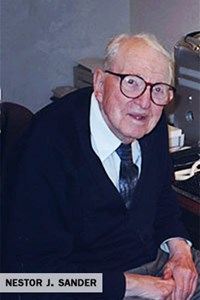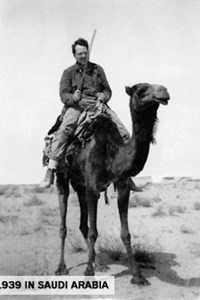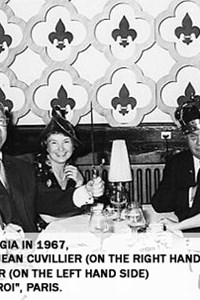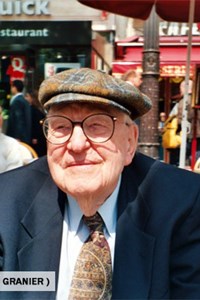Nestor J. Sander

Nestor John Sander (December 5, 1914 - February 11, 2012), "Sandy" for his friends, was a living history book, describing himself as a positivist.
Nestor was born and grew up in Oakland, California. In 1932, after graduating from high school, he moved on to the University of California at Berkeley where he earned a Bachelor degree in 1936, followed by a Masters degree in Paleontology in 1938. That same year he joined the California Arabian Standard Oil Company (CASOC), an affiliate of the Standard Oil of California (SOCAL, today's Chevron Corporation), which later (in 1944) became the Arabian American Oil Company, that is ARAMCO. Nestor was sent as a junior geologist for his first assignment to Saudi Arabia. That was before World War II started and much before the country became known as the major worldwide oil producer. There he probably gained his nickname and entered into the history of petroleum exploration, for he was given responsibility for the delineation of the Abqaiq field, which led to Ghawar, that was to become the world's largest oilfield: Sander's name will remain associated with those of pioneering explorationists in the Middle East, including "Dick" Bramkamp (Sander, 1959), Robert G.S. Hudson, "Mike" Morton (Dunnington et al., 1959; Q.M. Morton, 2006), R.W. Powers (1968), Max Steineke (Steineke et al., 1958), W. Sugden (Sugden & Stranding, 1975), René Wetzel (Dunnington et al., 1959), ... They are now almost forgotten for -with few notable exceptions- most of their work remains unpublished, being proprietary reports archived at their employers' headquarters.

In 1941 Nestor joined the American army and was assigned to intelligence services in Northern Africa and Europe because he could speak and read French (as well as German, Italian and Spanish). In Paris, he met Georgette Cordin, and they were married in 1946. Later the same year, Nestor was back in Saudi Arabia, followed by "Georgia" a few months later. They lived in Dhahran until late 1951 when he was given new responsibilities which led them to move to New York. On their way back to America, they stopped in Paris for a three-month long leave. During this short entr'acte Nestor completed the writing and editing of the manuscript of his D.Sc. thesis and defended it publicly in front of a jury presided by Professor Jean Cuvillier in Sorbonne University in early 1952 (an abridged version in French was published in 1962: an unpublished English version of this early work will be available soon in Carnets de Géologie). In 1955 Nestor resigned from ARAMCO and joined CONORADA Petroleum Corporation, a consortium created by Amerada Petroleum Corporation (today's Amerada Hess Corporation), Continental Oil Company (today's ConocoPhillips) and Ohio Oil Company (today's Marathon Oil Corporation), in charge of petroleum exploration outside the United States and Canada. In order to evaluate open acreage and screen farm-out offers, he travelled a lot (Europe, Central and South America, Africa, India, the Middle East). In 1963 he joined the American International Oil Company, a subsidiary of Standard Oil Company [Indiana] (later merged with BP). Still in charge of evaluation, he was sharing information with William E. Humphrey, the Vice-President Exploration at AIOC (Sander & Humphrey, 1965; Sander et al., 1975) and Colin Campbell, who became a prominent "Peak Oil" man (and the editor of a book with a chapter dedicated to Nestor: see Sander, 2011).

In 1967 Nestor published a practical classification of carbonate rocks which he first implemented while working in Saudi Arabia (and an early version of which was first exposed by Bramkamp & Powers, 1962): unfortunately his classification came up too late after those of Folk (1959) and Dunham (1962).
In 1977 the couple moved to Spain to enjoy retirement in the neighborhood of Madrid until Georgia's death in early 1992. To occupy his mind Nestor left Spain, travelled in Western Europe and started writing a manuscript entitled "Ibn Saud - King by conquest" (published in 2002). In 1994, he returned to California and decided to settle in Modesto.

Thanks to the development of the internet, he managed to keep abreast of modern developments in geology: we first met on the World Wide Web, but he was 87 years old when I met him in person in Paris. He then started a new "career" as a scientific writer when I invited him to contribute to some projects (Granier et al., 2006, 2009; Grosheny et al., 2011; Granier & Sander, 2012). On YouTube™, the "rednasrotsen's channel" (his name spelt right to left) includes a number of didactic videos he edited (17 of them are dedicated to stratigraphy and paleontology): his last months were dedicated to mounting a video dealing with the world of the Gastropods.
Last but not least, Nestor Sander was one of the founders of Carnets de Géologie: many non-native English speakers will remember him as a very kind and generous person who, for instance, helped them polish their manuscripts. We shall miss him!
Bruno Granier
Brest, March 11th, 2012
List of taxa described
- Lockhartia haimei var. nudimarginata Sander, 1962,
- Lockhartia haimei var. spirachordata Sander, 1962,
- Lockhartia haimei var. suturadicata Sander, 1962,
- Lockhartia haimei var. vermiculata Sander, 1962,
- Lockhartia lobulata Sander, 1962,
- Lockhartia retiata Sander, 1962,
- Miscellanoides Sander, 1962,
- Miscellanoides bramkampi Sander, 1962,
- Miscellanoides pruvosti Sander, 1962,
- Nummulites cizancourti Sander, 1962,
- Nummulites cuvillieri Sander, 1962,
- Rotalia jacobi Sander, 1962,
- Sakesaria abornata Sander, 1962,
- Sakesaria nodulifera Sander, 1962,
- Sakesaria tereta Sander, 1962,
- Sakesaria trichilata Sander, 1962.
List of dedicated taxa
- Hildaites sanderi arkell in arkell et al., 1952.
Bibliographic references
Arkell W.J., Bramkamp R.A. & Steineke M. (1952).- Jurassic ammonites from Jebel Tuwaiq, Central Arabia.- Philosophical Transactions of the Royal Society of London, (Series B, Biological Sciences), vol. 236, n° 633, p. 241-314.
Bramkamp R.A. & Powers R.W. (1962).- Classification of Arabian carbonate rocks.- Geological Society of America, Bulletin, Tulsa, vol. 69, n° 10, p. 1305-1318.
Dunham R.J. (1962).- Classification of carbonate rocks according to depositional texture.- American Association of Petroleum Geologists, Memoir, Tulsa, n° 1, p. 108-121.
Dunnington H.V., Wetzel R. & Morton D.M. (1959).- Mesozoic and Paleozoic. In: Iraq.- Lexique Stratigraphique International, Paris, vol. III, Asie, Fascicule 10a, first edition, paper-printed (1959), CNRS ÉDITIONS, 333 p.; new edition, electronic (2011), © Comité Français de Stratigraphie. Online at: http://paleopolis.rediris.es/LEXICON/IRAQ/
Folk R.L. (1959).- Practical petrographic classification of limestones.- American Association of Petroleum Geologists, Bulletin, Tulsa, vol. 46, n° 1, p. 1-38.
Granier B., Lethiers A. & Sander N.J. (2009).- "New studies on Triassic Siphoneae verticillatae" by Julius von Pia - The XXIst century edition. In: 6th Regional Symposium of the International "Fossil Algae" Association, Milan (July 1st-5th).- Museologia Scientifica e Naturalistica, Ferrara, Volume Speciale 2009, p. 35.
Granier B., Peebles R.G. & Sander N.J. (2006).- Discussion on the Jurassic evolution of the Arabian carbonate platform edge in the central Oman Mountains, Geological Society of London Journal, Vol. 162, 2005, pp. 349-362.- Journal of the Geological Society, London, vol. 163, n° 6, p. 1047-1050.
Granier B. & Sander N.J. (2012, in press).- "New studies on Triassic Siphoneae verticillatae" by Julius von Pia - The 100th anniversary edition.- ISBN 978-2-916733-11-1, Carnets de Géologie, Brest, Book 2012/01 (CG2012_B01).
Grosheny D., Granier B. & Sander N.J., eds. (2011).- Platform to basin correlations in Cretaceous times.- Boletín del Instituto de Fisiografía y Geología, Rosario, vol. 79-81, p. 1-19.
Lavaud S. (1955).- Catalogue des thèses de Doctorat ès Sciences naturelles soutenues à Paris de 1891 à 1954.- Person, Paris, 257 p.
Morton M.Q. (2006).- In the heart of the desert.- ISBN 978-0-955221-20-0, Green Mountain Press, Aylesford, 266 + xvi p.
Powers R.W. (1968).- Saudi Arabia (excluding the Arabian Shield).- Lexique Stratigraphique International, Paris, vol. III, Asie, Fascicule 10b1, first edition, paper-printed (1968), CNRS ÉDITIONS, 177 p.; new edition, electronic (2010), © Comité Français de Stratigraphie. Online at: http://paleopolis.rediris.es/LEXICON/KSA/
Sander N.J. (1952).- La stratigraphie de l'Éocène le long du rivage occidental du Golfe Persique.- In-4°, III-256 ƒƒ., 27 pl. h.-t. dont 11 cartes, 20 coupes h.t. [as cited in Lavaud, 1955]
Sander N.J. (1959).- Memorial Richard Allan Bramkamp.- Notes et Mémoires sur le Moyen-Orient, Paris, tome VII, p. 263-265.
Sander N.J. (1962).- Aperçu paléontologique et stratigraphique du Paléogène en Arabie Séoudite orientale.- Revue de Micropaléontologie, Paris, vol. 5, n° 9, p. 3-40.
Sander N.J. (1967).- Classification of carbonate rocks of marine origin.- American Association of Petroleum Geologists, Bulletin, Tulsa, vol. 51, n° 3, p. 325-336.
Sander N.J. (2002).- Ibn Saud - King by conquest.- ISBN 0970115768, Selwa Press, Vista, 360 p.
Sander N.J. (2011).- 19: Nestor Sander. In: Campbell C. (ed.), Peak oil personalities.- Inspire Books, Skibbereen, p. 239-241.
Sander N.J. (2012, in press).- Paleontologic and stratigraphic overview of the Paleogene in eastern Saudi Arabia.- Carnets de Géologie [Notebooks on Geology], Brest, Article 2012/04 (CG2012_A04).
Sander N.J. & Humphrey W.E. (1965).- Why look for oil and gas in the North Sea? Institute of Gas Engineers, Annual general meeting, n° 102, Publication, n° 677, 17 p.
Sander N.J., Humphrey W.E. & Mason J.F. (1975).- Tectonic framework of Southeast Asia and Australasia: Its significance in the occurrence of petroleum.- 9th World Petroleum Congress (May 11-16, 1975), Tokyo, PD 7(4), p. 83-105.
Steineke M., Bramkamp R.A. & Sander N.J. (1958).- Stratigraphic relations of Arabian Jurassic oil. In: Weeks L.G. (ed.), Habitat of oil.- The American Association of Petroleum Geologists, Tulsa, p. 1252-1278.
Sugden W. & Stranding A.J. (1975).- Stratigraphic Lexicon: Qatar Peninsula, In: Qatar Peninsula.- Lexique Stratigraphique International, Paris, vol. III, Asie, Fascicule 10b3, first edition, paper-printed (1975), CNRS ÉDITIONS, p. 7-88; new edition, electronic (2012), © Comité Français de Stratigraphie. Online at: http://paleopolis.rediris.es/LEXICON/QATAR/
